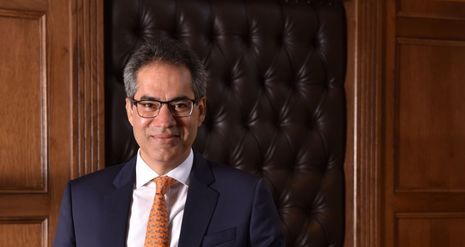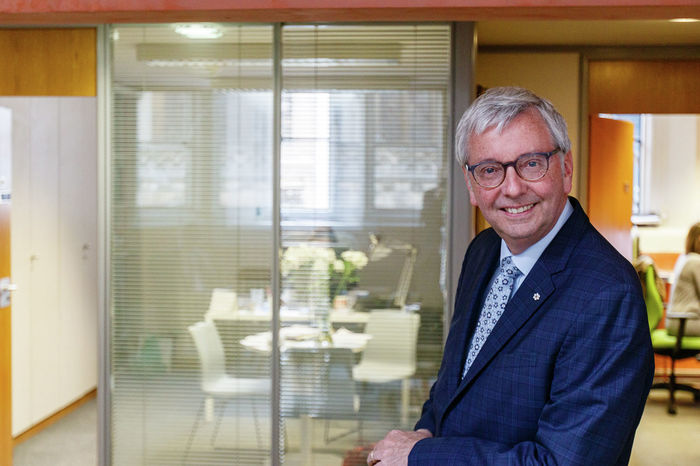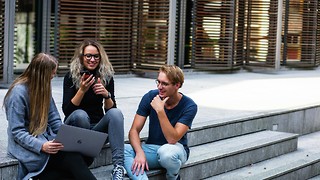Pro-Vice-Chancellor Kamal Munir on diversity and inclusion at Cambridge
The Pro-Vice-Chancellor told Marion Willingham where he believes the University can make progress after his first term in the Old Schools

The journey through the Old Schools is complicated. It involves yellow slips of paper, a series of one-way glass doors, spiral staircases, corridors, offices – some open, some firmly closed. I’m here to meet Pro-Vice-Chancellor Kamal Munir, who I hope can shed some light on what actually goes on in here.
“To me,” he says, “all of what we do in the Old Schools basically comes down to three things: research, teaching, and contributing to society.” Simple, right? And yet when I ask what Munir’s own role entails, the list is extensive. “A lot of it is about the people who work in the university – we have about 13 thousand staff.” “Recruitment of staff, their progression, promotions, retirement, grievances – that all falls with me. And their pensions and pay, which means I have to work with unions on these issues as well. Then there’s the equality, diversity and inclusion aspect, and finally there are the museums and the gardens, where a lot of our community engagement is anchored.” Not so simple.
While Munir undeniably has a lot of respect for the institution, praising the talent and hard work of his colleagues, when prompted on issues Cambridge faces he produces a list without hesitation. Firstly: “We had to start a lot of different projects to deal with the pandemic, and to plan for the post-pandemic future. A lot of teaching went online, but we just kind of fell into that. My colleagues just put their laptops on ironing boards or piles of books and started teaching from there. But if it’s going to be around for a while, we need to start thinking more systematically about that. Is it affecting research productivity? Is it affecting our culture in the workplace? Is it affecting how we recruit?”
Munir’s second issue comes up repeatedly during our discussion. “This is a highly devolved university. It can end up in a situation where we’re all working in silos.” “We should have more discussion here. We should have more debate here.” He adds that: “This is not just a university-wide phenomenon, it goes beyond the University, there is polarisation on a lot of issues. That leads to a trust deficit, with our colleagues, with other parts of the University, and the best way I know of reducing a trust deficit is engaging more, communicating more, and getting to know each other.”
“We should have more discussion here. We should have more debate here”
“And then there’s the Human Resources system we have right now – it really limits what we can or cannot do. The HR system should be able to tell me how many people applied for a job in the university, how many were shortlisted, who was shortlisted, so I should be able to see patterns there, are there any biases in what we are doing?” “I should also have data on how much we are paying to whom, so I can do all kinds of data analytics. We are limited in how much of that we can do, especially because of the devolved nature of the University.”
This data is crucial for the equality, diversity and inclusion aspect of Munir’s role. “There are of course some numbers we have to look at: widening participation, hiring more women, reducing the gender pay gap. But there is work to be done beyond the numbers. It is important to create a space where people can be themselves, and they don’t feel the necessity to suppress part of who they are.” “That’s the kind of space we’ve been trying to create, and in the past four or five years we have made a lot of progress towards that, where people are able to raise issues that they were more reluctant to raise, where people are checking themselves before saying things, where people are revisiting the curricula that they are teaching and trying to be more inclusive.” “Hopefully we can change the normal, and that takes time.”
Munir’s understanding of these issues is nuanced. He speaks particularly attentively about class. “Class is often not as visible as race or gender are, at least right away. And in many countries it is seen as divisive, to talk about class. We need to change that.” He recognises that in addition to disparities in resources and aspirations, which develop before university, class can influence social experiences upon arrival: “Once you arrive here, you go into your cliques, both staff and students. A lot of our staff will have a lot in common; others will feel left out of that. How do we bring people together, and make people respect each other for things that they have not always valued?” He also notes that: “Class can be overlooked when we become too obsessed with either race or gender, and start initiatives with only the middle class in mind.”
“Hopefully we can change the normal, and that takes time”
Thinking about creating inclusive spaces, I ask Munir about the movements to ‘decolonise’ the Cambridge museums. “In some cases, those people may be right,” he says. “If there is a particular artefact with a particular provenance and that country is after us to have it back, and they have created a museum for it, certainly we should engage with that – though it would be great if they would let us use some of the artefacts for educating and researching.” “Whether we end up emptying the museums of those artefacts or not, the process matters. In that process of discussion and debate, in which there is wide engagement, students will learn things that they wouldn’t otherwise, and that is very useful. Different people will have different opinions on this, but that process, I think, is invaluable.”
Thoroughly considered and debated change seems to be Munir’s preferred means of making progress. When I suggest more radical, structural change, he offers: “Organisations are products of the challenges they face, so we need to be cognisant of that, but we also don’t want to come in with an agenda of wanting to change everything, because this institution has achieved a lot – is achieving a lot – so let’s preserve the things that make us Cambridge.”
 News / British Academy elects 12 Cambridge academics22 July 2025
News / British Academy elects 12 Cambridge academics22 July 2025 News / Lord Smith elected Cambridge chancellor23 July 2025
News / Lord Smith elected Cambridge chancellor23 July 2025 News / Right-wing group calls for charges over Balfour portrait vandalism24 July 2025
News / Right-wing group calls for charges over Balfour portrait vandalism24 July 2025 Lifestyle / Keeping the spark alive (platonic edition)24 July 2025
Lifestyle / Keeping the spark alive (platonic edition)24 July 2025 Comment / Stop disarming people of their nuance23 July 2025
Comment / Stop disarming people of their nuance23 July 2025








